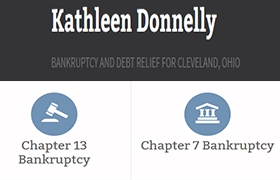Brook Park Bankruptcy & Debt Lawyer, Ohio, page 2
Sponsored Law Firm
-
 x
x

Click For More Info:
-
Law Office of Kathleen Donnelly
526 Superior Ave #1030 Cleveland, OH 44114» view mapChapter 7, Chapter 13, Free Evaluations Need Debt Relief? Contact Me Today
There is hope for debt relief. At the Cleveland, Ohio, law office of Kathleen Donnelly, we help people like you to escape from under mountains of debt.
800-413-4100
Ricky Lee Bertram
Real Estate, Federal Appellate Practice, Corporate, Commercial Bankruptcy
Status: In Good Standing Licensed: 40 Years
Fred George Hopp
Family Law, Criminal, Banking & Finance, Bankruptcy
Status: In Good Standing Licensed: 38 Years
Michael Kenneth Provenza
Bankruptcy, Family Law, Federal Appellate Practice, Criminal
Status: In Good Standing Licensed: 33 Years
Bradric Thomas Bryan
Workers' Compensation, Corporate, Collection, Personal Injury
Status: In Good Standing Licensed: 35 Years
Lawrence Paul Borosh
Real Estate, Federal Appellate Practice, Administrative Law, Commercial Bankruptcy
Status: In Good Standing Licensed: 55 Years
Mary Elizabeth Papcke
Elder Law, Insurance, Collection, Personal Injury
Status: In Good Standing Licensed: 41 Years
Donald Hazard Powers
Real Estate, Electronic Commerce, Corporate, Commercial Bankruptcy
Status: In Good Standing Licensed: 70 Years
Scott David White
Collection, Family Law, Federal Appellate Practice, Bankruptcy
Status: In Good Standing Licensed: 32 Years
John H. West
Litigation, Family Law, Bankruptcy, Personal Injury
Status: In Good Standing Licensed: 42 Years
Matthew Thomas Gilmartin
Litigation, State Appellate Practice, Business & Trade, Credit & Debt
Status: In Good Standing Licensed: 42 Years

 Kathleen Donnelly Cleveland, Ohio
Kathleen Donnelly Cleveland, Ohio About UsKathleen Donnelly
About UsKathleen Donnelly Contact UsCall or Email Right Now
Contact UsCall or Email Right Now
